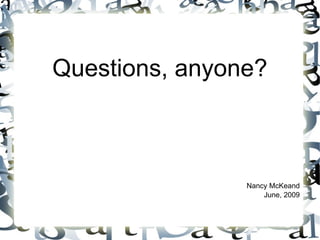
Question Formation
- 1. Questions, anyone? Nancy McKeand June, 2009
- 2. How do we form questions? For most verbs, we form the question this way: Question word Auxiliary Subject Verb Rest of the Question Who did they see at the library? Where do you live? Why did you come to ENMU? When will you go home? Do you like Mexican food? Will you get a job? Does Tom like music? Sometimes there is a question word, and sometimes there isn't. Sometimes the verb is the end of the question, and sometimes it isn't. But the pattern is the same.
- 3. How do we form questions? “Who” questions are sometimes formed another way. It depends on whether we want to know about the one who performs the action or the one who receives it. Question word Auxiliary Subject Verb Rest of the Question Who did they see at the library? Who do you live with? Who does Mary like best? In these cases, the answer to the question would be the object of the sentence – the one who receives the action. They saw Tom. I live with my father. Mary likes me best.
- 4. How do we form questions? When the answer to the question is the subject, the question is formed like this: Who Verb Rest of the Question Who ate the ice cream? Who did their homework? Who works at the library? In these cases, the answer to the question would be the subject: Tom ate the ice cream.. We all did our homework. Ann works at the library.
- 5. How do we form questions? With the “be”verb, we form the question this way: Question word Verb Subject Rest of the Question Where is your mother? Why are they here? Are you Chinese? Was Tom a teacher? Sometimes there is a question word, and sometimes there isn't. Sometimes the subject is the end of the question, and sometimes it isn't. But the pattern is the same.
- 6. How do we form questions? Questions with “who” and the “be” verb are different. Who Verb Rest of the Question Who is your mother? Who are they? Who was the president in 1998? Who is responsible for the mess? “Who” is followed by the verb and then the rest of the question. There is no auxiliary before the action verb.
- 7. So to form questions... You only have to remember three things: Most verbs - Question word/auxiliary/subject/verb/rest of question “Be” verbs – Question word/”be” verb/subject/rest of question “Who” as the subject - Who/verb/rest of question
